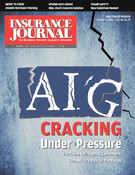Nearing the end of a years-long highly specialized residential construction project, one Hurricane Katrina survivor has become a regular stop for insurance industry representatives touring along the Mississippi Gulf Coast.
In some ways, Scott Sundberg of Pass Christian, Miss., is the poster boy for post-Katrina recovery, although he began his stance against hurricane-force winds long before that fateful day in August 2005. For more than nine years, Sundberg has toiled on weekends and in his spare time to construct a fortified concrete home that he says will withstand the winds of high-category named storms and their associated projectile debris. He has worked closely with insurance agents, emergency management entities and state and local officials as a building standards advocate throughout the process.
While major storms recently rumbled through the Gulf of Mexico on their way to Texas and Louisiana, Sundberg, a design engineer and major contributor to the FEMA 550 report published in July 2006, neared completion of his concrete home in an area that was all but wiped off the map three years ago.
“We’re three to five weeks from finishing,” Sundberg said on Sept. 18. “We’re not living in it yet but the kitchen is complete and the air conditioning is installed.”
Sundberg and his wife were living in a nearby residence while working on their concrete home when Hurricane Katrina hit. Since the 2005 storm, they have resided in a small mobile trailer on their construction site just across Highway 90 from the beach.
Sundberg said his insurance agent, David Treutel of Bay St. Louis, Miss., secured a great deal on his homeowners policy — even lower than if he had gone through the state’s wind pool. He said the premium was based less on the home’s concrete fortification and more on Treutel’s dedication to bringing insurers into a market where the better-built philosophy is taking root.
Treutel, who is also the wind pool board vice chairman, said the pool is trying to bolster its standing with reinsurers by providing more information on building standards. In what is becoming an annual event, Treutel hosted a group of international reinsurers on a tour along the Mississippi coast in mid-September. The tour took place in conjunction with a state wind pool meeting.
“We had eight reinsurers here this year. We only had three last year,” Treutel said. “We’re trying to incentivize insurance companies to insure better-built homes. The state (insurance) commissioner adopted the wind pool’s plan of operations, which provides incentive to write wind.”
Treutel said if insurers agree to cover a certain amount of risk, they will be eligible for a “recoupment” program that will allow them to recover monies through assessments after a catastrophic event.
Treutel said six insurance companies covered 90 percent of Mississippi’s coastal risk prior to Katrina. He would like to see a more equitable distribution and mentioned a desired scenario where 50 insurers would each assume 2 percent of the risk
Treutel said the wind pool does not have a loss of use provision yet, but reinsurers are taking interest in the state’s proactive mode. He said when reinsurers visit, the wind pool board’s ears are wide open to suggestions on how to drive reinsurance costs down.
While Sundberg is enjoying a relatively good deal on his homeowners’ premium, he says he is concerned that the wind pool is not charging enough for wind policies. He is a proponent of insureds appropriately paying for the risks they assume.
Sundberg is concerned that if local builders do not step up to the plate by building to maximum fortified standards, his efforts will be diminished. He reported seeing damage to some of the new traditional construction in his neighborhood on the heels of Hurricanes Gustav and Ike.
“We know what to do and how to do it,” Sundberg added. “Until everyone has to adhere to the same standards, it’s a bitter pill to swallow. We really don’t have an option. To me it is not a question of can we afford to build right; it’s a question of how can we afford not to. The best insurance is assurance and time is of the essence.”
Topics Reinsurance Hurricane Mississippi
Was this article valuable?
Here are more articles you may enjoy.


 Chubb Posts Record Q4 and Full Year P/C Underwriting Income, Combined Ratio
Chubb Posts Record Q4 and Full Year P/C Underwriting Income, Combined Ratio  Chubb CEO Greenberg on Personal Insurance Affordability and Data Centers
Chubb CEO Greenberg on Personal Insurance Affordability and Data Centers  What Analysts Are Saying About the 2026 P/C Insurance Market
What Analysts Are Saying About the 2026 P/C Insurance Market  Allstate CEO Wilson Takes on Affordability Issue During Earnings Call
Allstate CEO Wilson Takes on Affordability Issue During Earnings Call 


